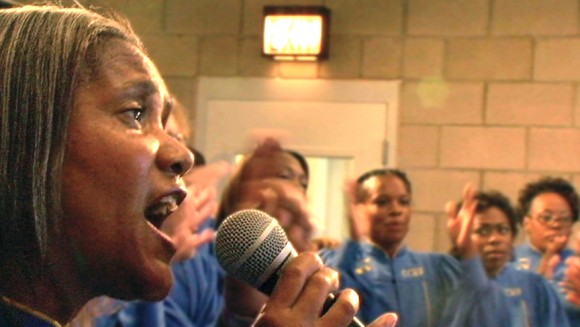EIFF REVIEW: Crime After Crime commits a few of its own
 There are a few things that you should know if planning to attend the documentary “Crime After Crime,” airing today at Empire City Centre at 4:45 pm as part of the Edmonton International Film Festival.
There are a few things that you should know if planning to attend the documentary “Crime After Crime,” airing today at Empire City Centre at 4:45 pm as part of the Edmonton International Film Festival.
First, the subject of the documentary, Debi Peagler, should have been out of jail years ago. Instead, she served 26 years before receiving parole, months before her death.
Second, that does not make her an innocent victim. The evidence that convicted her of helping plan and execute her boyfriend for insurance money still stands. Her conviction still stands.
Third, this documentary is not – I repeat, not – a piece of fair and objective journalism, nor is it a convincing document of a significant miscarriage of justice, for the sheer fact that it is mercilessly, mercilessly biased. It even ends with a note that refers to “other victims of wrongful incarceration.”
That accusation and many more may be true, but it was hard not to have that unsettling feeling you get after watching any piece of propaganda.
It’s very likely, as suggested by a related arrest and neighbourhood reports, that Peagler was badly abused by her boyfriend. Nonetheless, she pleaded guilty in 1982 to planning his murder, and hiring two local gang members to commit it. She received $17,000 in insurance money.
Almost none of the actual facts in evidence at the time of her conviction are presented in this documentary, which makes it substantially easier to be sympathetic. Instead, we are largely given a performance piece by her two lawyers, right down to obviously scripted “live hits.” They agree early on into her case to work with a documentarian who also thinks she received a raw deal.
While there are doubts about the veracity of evidence given by one of the men who confirmed the plan, at the time of her initial plea, Peagler did so as well. Peagler led Oliver Wilson to a park where the two men strangled him, and later pleaded to first-degree murder. She later changed her story, claiming her mother had just asked them to beat Wilson up and that the insurance was a coincidence. Her lawyers argue the initial confession was coerced, because her plea was to avoid the death penalty.
Of course, time and heightened public sympathy for abuse victims have caused many to look at women who murdered their abusers as special cases deserving leniency, and that’s often true. In Peagler’s case, however, as the state noted, she was not living with him at the time, was not in immediate risk from him and had not reported any abuse to the police.
None of this is discussed; it is presupposed that the audience is going to be engaged in too much sympathy to overlook the cold and calculated nature of the crime – because they largely leave out the details that make it look cold and calculated. They cast her ex-boyfriend as the monster – which he may well have been – then cast around Peagler’s ex-neighbourhood for sympathetic friends and family who think she’s served her time.
And really, she has. That’s one of the most disappointing elements of Crime After Crime. It so heavily and perversely oversells a relatively simple argument: an abuse victim should get extra leniency during sentencing. Instead, it tries to weave Peagler into some near-mythic figurehead bouncing back from injustice.
Prosecutorial misconduct in the original case – some doubts about evidence were withheld from defence attorneys – is used to suggest a broad desire to cover up why she isn’t being released by the administration at the time the film was shot, again without comment from those people.
For the record, the DAs office called Peagler “a hardened and conniving killer who has made contradictory statements about her role in the murder and is exactly where she belongs. She planned a murder, cashed a $17,000 insurance policy and is now exagerrating the abuse she suffered as a way to get out of prison.”
Almost none of this is presented in the documentary proper which, by the end, has Peagler singing in prison with Arrested Development, leading prayer sessions and all sorts of other worthy reinventions of her once sad life. It’s the kind of thing film critics and malleable audiences love, but journalists who look for fine detail hate. Because the devil is always in the details.
There’s another incontrovertible fact that also isn’t included or discussed in Crime After Crime: thousands and thousands of abused women manage to escape that abuse without taking out an insurance policy and hiring two hitmen, or spending the money. We sometimes would like to think they should, but as a society agree they shouldn’t.
Even Peagler herself has the decency to talk about how she knows what she did was wrong, to address how important it is that her victim’s family forgives her– and it’s clear she was far more in touch with the reality of the situation than her lawyers and their collaborating documentarian.











